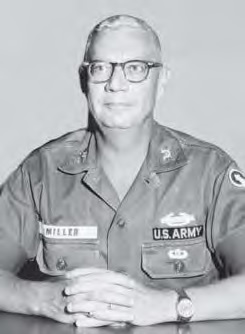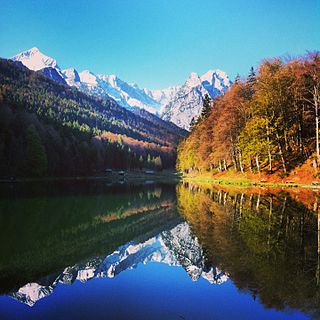
The 1936 Winter Olympics, officially known as the IV Olympic Winter Games and commonly known as Garmisch-Partenkirchen 1936, were a winter multi-sport event held from 6 to 16 February 1936 in the market town of Garmisch-Partenkirchen, Germany. Germany also hosted the 1936 Summer Olympics, which were held in Berlin. It was the last year in which the Summer and Winter Games both took place in the same country.

Garmisch-Partenkirchen is an Alpine ski town in Bavaria, southern Germany. It is the seat of government of the district of Garmisch-Partenkirchen, in the Oberbayern region, which borders Austria. Nearby is Germany's highest mountain, Zugspitze, at 2,962 metres (9,718 ft) above sea level.

Karl Schranz is a former champion alpine ski racer from Austria, one of the best of the 1960s and early 1970s.
The FIS Alpine World Ski Championships 1978 were held in Garmisch-Partenkirchen, Bavaria, West Germany, between 29 January and 5 February. It held competitions in alpine skiing like downhill, special slalom, giant slalom and combined. The combined was only a "paper race".
The IBSF World Championships, part of the International Bobsleigh and Skeleton Federation, have taken place on an annual basis since 1930. Starting with 2002, no World Championships being held in non-Winter Olympic years. A two-man event was included in 1931 with a combined championship occurring in 1947. Men's skeleton was introduced as a championship of its own in 1982 while women's bobsleigh and skeleton events were introduced in 2000. Both the women's bobsleigh and skeleton events were merged with the men's bobsleigh events at the 2004 championships. A mixed team event, consisting of one run each of men's skeleton, women's skeleton, 2-man bobsleigh, and 2-women bobsleigh, was held from 2007 to 2019. In 2020 it was replaced with skeleton mixed team event, consisting of one run each of men's and women's skeleton. Women's monobob event was included in 2021.
The FIBT World Championships 1953 took place in Garmisch-Partenkirchen, West Germany for the third time after previously hosting the four-man event of the championships in 1934 and 1938. The event was marred by the death of Switzerland's Felix Endrich who won the two-man event gold medal only to die in competition during the four-man event a week later.
Felix Endrich was a Swiss bobsledder who competed in the late 1940s and early 1950s. Competing in two Winter Olympics, he won the gold medal along with brakeman Fritz Waller in the two-man event at the 1948 Winter Olympics in St. Moritz.
Fritz Schwarz was a German bobsledder who competed in the 1930s. He won two medals at the 1934 FIBT World Championships with a gold in the four-man and a silver in the two-man event.
David Looker was a British bobsledder who competed in the late 1930s. He won two gold medals in the four-man event at the FIBT World Championships, earning them in 1937 and 1938.

Hubert G. Miller was an American bobsledder who competed in the 1950s. He won a gold medal in the four-man event at the 1953 FIBT World Championships in Garmisch-Partenkirchen. Competing in two Winter Olympics, Miller earned his best finish of ninth in the four-man event at Oslo in 1952.
Walter Haller was a West German bobsledder who competed in the late 1950s. He won a gold medal in the four-man event at the 1958 FIBT World Championships in Garmisch-Partenkirchen.
Ludwig Siebert was a West German former bobsledder who competed during the 1960s. He won two gold medals in the four-man event at the FIBT World Championships. The gold in 1966 was awarded following a crash that killed his fellow athlete Toni Pensperger during the four-man event. Pensperger was posthumously awarded the gold medal while Siebert and his surviving teammates Helmut Werzer and Roland Ebert received their golds as well. Siebert also finished fifth in the four-man event at the 1964 Winter Olympics in Innsbruck.
René Henri Theophile Lunden, Baron de Lunden was a Belgian bobsledder who competed in the late 1930s. He won a gold medal in the two-man event at the 1939 FIBT World Championships in St. Moritz.

Riessersee is a German lake located in southwest Garmisch-Partenkirchen. The lake itself hosted the speed skating events and 10 of the 37 ice hockey games for the 1936 Winter Olympics. Adjacent to the lake, the bobsleigh events took place.

The Bundesstraße 23 is a German federal highway in Bavaria that runs about 59.2 kilometres, from Peiting to the Austrian border near Garmisch-Partenkirchen. This highway (partially), along with the Bundesstraße 17 and Bundesstraße 472 highways, constitute the “German Alpine Road”. Coupled with the Bundesstraße 2 highway, it passes through cities such as Mittenwald, Innsbruck and the Brenner Pass.
For the 1936 Winter Olympics in Garmisch-Partenkirchen, Germany, a total of six sports venues were used. Alpine skiing events took place for the first time and were held in three different locations. Riessersee held the speed skating and some of the ice hockey matches while the bobsleigh events took place south of the lake. The ski jump and its neighboring stadium played host to the cross-country skiing, Nordic combined, and ski jumping events. Even though figure skating and some of the ice hockey matches took place outdoors at the ice stadium, the ice itself was artificially refrigerated to prevent ice thawing.
For the 1956 Winter Olympics in Cortina d'Ampezzo, Italy, a total of eight sports venues were used. All of the venues used were new or rebuilt. To make use of television coverage for the first time in the Winter Olympics, the cross-country skiing stadium was constructed to allow the best coverage. Five of the venues used for these games would appear in the James Bond film For Your Eyes Only twenty-five years later.
Herman Jan "John" Semmelink was an alpine ski racer from Canada.

The fifth edition of the annual Four Hills Tournament in Germany and Austria was won by Pentti Uotinen. Another Finnish athlete, Eino Kirjonen placed second in the overall ranking for the third time. It was the first edition without the winner of the inaugural tournament, Sepp Bradl.






